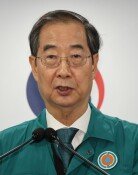Negative political ads
Negative political ads
Posted April. 11, 2017 07:13,
Updated April. 11, 2017 07:20
Despite opposition, negative campaigning happens all the time probably because it is effective. In 1964, the Lyndon Johnson camp of the U.S. Democratic Party aired the famous “Daisy ad” in which a girl counts the petals of daisy in a field with a scene of a missile launch countdown and she eventually disappears with a nuclear explosion. It contributed greatly to his landslide victory in the election though the ad involved some exaggeration implying that Barry Goldwater, the Republican rival, could cause a nuclear war.
Negative campaigns such as “If you vote for Ahn Cheol-soo, Park Jie-won (the party leader) will become an ex-king” and “If you vote for Moon Jae-in, the new administration will be the same as the Roh Moo-hyun administration” can be made because they are matter of different perspectives. Arguments such as “Clarify the asset details of Ahn’s daughter” or “Show us the application form of Moon’s son” should be made continuously until there is no doubt left. Concerns are, however, that negative political campaigns based on fake news such as “He drove away the bereaved families of the soldiers who died in the sinking of the corvette Cheonan” and “Hundreds of Shinchonji (a cult) members joined the party.”
Some negative ads rather cause backlash, instead of being proven effective. One of the claims is that Ahn had a photo-op with gangsters. It is not sure whether they were real gangsters or not, but politicians have their pictures taken with numerous people. The same applies to a case where some attack that a candidate had a proof selfie in front of the tragic Sewol ferry while others blame that they did the same. As camps start every morning with negative campaigning, some jokingly say they say “Moon morning” or “Ahn Morning,” instead of “Good morning.”
Few candidates talk about their weakness first. Without negative campaigning that points out opponents’ weaknesses, voters will only end up having information that candidates want to deliver. As some politicians claim, this is why negative ads are necessary. Voters would not have known that Hwang Tae-sung, a North Korean spy, was caught on his way to meet the then President Park Chung-hee, without the negative ad by Yoon Po-sun who was running for presidency against Park Chung-hee in the 1963 presidential election. If negative ads are necessary, hopefully, they could contain more valuable information or perspectives.







